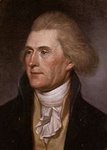Sound the Buzzhorn! Whitfield and Today's Disconection
Rob W. Oakley

-----George Whitefield, born December 16, 1714, was an entrepreneurial prodigy so to speak taking up his recently deceased father’s business and quickly learning the tools of the trade and became an excellent salesman. Later on Whitefield would acquire the aid of a stepfather and worked very closely with his family. Other then obtaining a vast understanding of sales and business, Whitefield also went on with an interest in commerce and evangelism.
-----After reading Frank Lambert's scholarly article “Pedlar in Divinity” one can very well come to the conclusion that Whitefield was hardly a pedlar but a man who knew how to take advantage of the leading mediums of communication. Rather then using any profit gained for the benefit of his own welfare, Whitefield would go on to sustain the advertisement of his work and his ministry to the less fortune.
----It was a social dilemma in that no one had any desire to gather in the name of commerce or the name of God. It was this matter, which sparked Whitefield's interest in that he knew; in order to sustain a body of believers and the governing forces between them, the people must mobilize and remain active together. Unfortunately, this was not the great case of the time until George Whitefield and his booming evangelical voice was heard throughout the New World.
-----In 1734-1735, Whitefield oversaw many of the initial stirrings of the First Great Awakening along with the other powerful and influential speakers such as Jonathan Edwards. The people were more then likely growing weary of the general topics being merely of who is and who is not of the proper doctrine. It was a battle of “Free Will” versus “Elected Grace” and many were beginning to feel like nothing more but empty and hopeless shells damned to be thrown away. On the contrary, Whitefield would assure that humankind at least have the powers within themselves to make a difference in the world around them. It was wrong for them to think condemning one another was more crucial then leaving such responsibility to God. Without first seeking the kingdom of heaven, they were instead seeking their own answers to the mystery of God's sovereign hand. Whitefield challenged their thinking and called them to dress better, to read better books, and to start pointing their fingers at themselves instead of one another.
-----George Whitefield was extraordinarily good at acquiring the attention of an audience (and a large one at that) so much to the effect that crowds would spontaneously appear from out of nowhere. One individual in particular was Benjamin Franklin.
-----Now of course, Franklin had every intention to make a profit off the charismatic Whitefield. Therefore, it would seem that the true Pedlar in this situation was Franklin and Whitefield being of the divine—that is the divine influence of God. Taking all of Whitefield's journals, sermons, prayers, and pamphlets, Franklin took it all and published them on mass scale including the mainstream of the city's newspaper. Some were greatly agitated of the situation, calling it religious propaganda. As long as Franklin was making a profit, however, and Whitefield continued to generate an audience, there was no stopping such a landslide revival. Although it all does seem to be propaganda and highly compromised due to a conflict in interest, there were still many converting to Christianity and making effective and immediate changes.
-----After all this success, the Great Awakening would soon come to an end, yet the impact continued to last echoing from generation to generation. Nevertheless, up until now it would seem there has been a drastic decline once again within today's society. With the advent of the World Wide Web, telecommunications, video-to-video conferences, and digital downloads of podcasts and even books, it would seem that the people are no longer mobilizing. Of course, there are vast amounts of social networks such as Facebook, Blogspot, and even You Tube but there is still a lack of the intimate “togetherness” necessary for a growth in relationship. There are no longer questions being asked, instead it would seem that the many happenings in a person's life are being “presented” to the observer rather then shared intimately.
-----There's a social bound between two individuals when they speak face to face. Although instantaneous messaging between chat rooms and texting and even live broadcast has brought the world closer together, not many are truly close. The moment the television is turned on, the family will no longer speak at the dinner table. Rather then interacting with each other they instead interact with the celebrity or politician on the screen, and yet, they cannot even talk to those projected images or ask them pressing questions.
-----Knowing all of that, could it be possible to have a revival today? Would George Whitefield's crucial techniques and voice be as effective? Could it be done better with today's technology? There have been numerous occasions when the people have actually gotten together as one and united community. However, and as of late, it would seem that is has taken great tragedy to enable such a thing to effectively motivate the movement. It would seem in order to get involved one must first know and then care to get involved. The problem with today's society and the problem Whitefield would face is that there are too many stuck in wondering the worse between two very unfortunate vices—ignorance and apathy. If the people do not know to get involved, more then likely they do not care to get involved either and it may be very well because of a lack of involvement between one individual to the next.
-----“Not only did Whitefield view commerce and religion as compatible, he maintained that trade was an essential feature of the divine economy. He argued that God would have deemed creation incomplete if his human creatures lacked company. Therefore, the Almighty made it impossible that “communities be kept up, or commerce carried on, without society.” Indeed, “Providence seems[ed] wisely to have assigned a particular product to almost each particular Country, on Purpose, as it were to oblige us to be social.” Whitefield concluded that the mutual dependence of commerce and society demonstrated that “the one great end of [human] existence,” consisted in individuals' being useful to each other in social life. Toward that end, he determined to share his “particular product”--his evangelical message—with the widest possible audience through the means at hand.
BIBILOGRAPHY
Lambert, Frank. “Pedlar in Divinity:” George Whitefield and the Great Awakening, 1737-1745. The Journal of American History, (December 1990): 812-837.













No comments:
Post a Comment